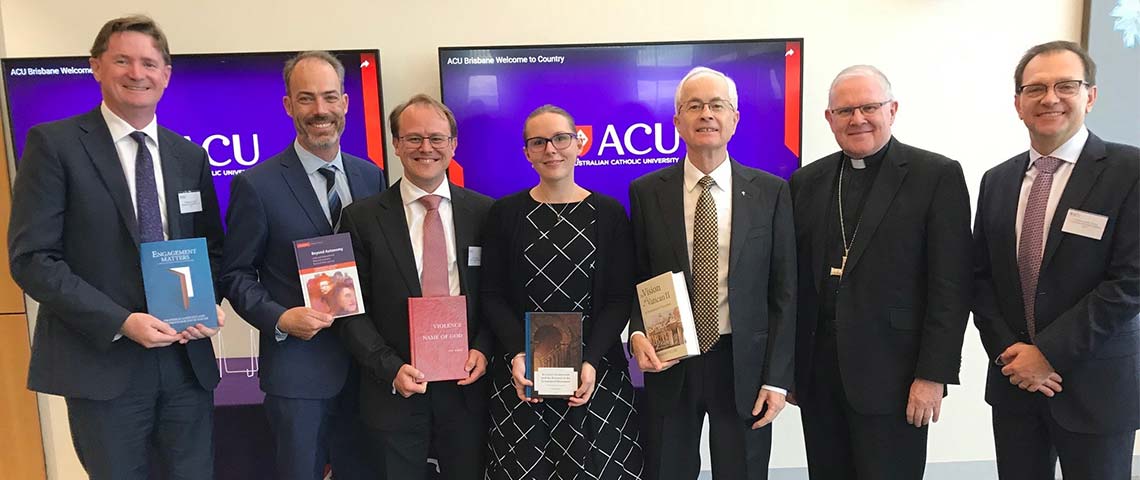Maintaining the Church's contemporary relevance requires continuing research into theology, curriculum, and ethics to advance understanding of current issues from climate change to poverty and militant jihadism.
Recent books published by Australian Catholic University authors illustrate the breadth of the university's research and its relevance to contemporary living.
ACU held a launch at the McAuley Campus in Brisbane to celebrate the books in theology, ethics and engagement published over the past year – when Covid-19 prevented timely launches.

ACU Vice-Chancellor and President Professor Zlatko Skrbiš emphasised the real-world value of the research.
"These books span the subject areas of theology, ethics and engagement — areas that speak directly to ACU's mission, and to the fundamental tenets that form the basis of our institutional ambition," Professor Skrbiš said.
"All five books being celebrated here today have a real impact on the communities we serve, and address many of the concerns of Pope Francis and the Catholic Church.
"These works contemplate the 'good' such as ecumenism, research ethics and a renewed vision for the Vatican and seek to address what have been termed the 'wicked' issues including inequality, exclusion, exploitation, climate change and violent extremism."
The Most Reverend Mark Coleridge, Archbishop of Brisbane also acknowledged the value of the research.
"In many ways and in many fields, Queensland has punched above its weight in a country where many see the state as no more than a holiday destination," he said.
"But these works by writers associated with Australian Catholic University in Brisbane show the range and quality of the research and writing being done in the 'Sunshine State'.
"Each book in its own way shows that there's light as well as heat in Brisbane. Each contributes substantially to the engagement of faith and reason in Australia and beyond at a time when that is more necessary than ever."
The five new books are:
The Vision of Vatican II: Its Fundamental Principals
Rev Associate Professor Ormond Rush
Winner of Best Theological/Philosophical Studies book, Catholic Media Awards 2020
Unique in the literature about Vatican II, this book synthesises and analyses the 16 documents of Vatican II into 24 principles, which can function as criteria for assessing the reception of the conciliar vision over the past five decades and into the future.
Beyond Autonomy: Limits and Alternatives to Informed Consent in Research Ethics and Law
Dr David Kirchhoffer (editor)
Informed consent is a fundamental value of research ethics in many cases autonomy is lacking (infants), diminished (addicts), or compromised (low socio-economic status).
This book explores the alternative and complementary concepts to overcome the limits of respect for autonomy, including beneficence, dignity, virtue, solidarity, non-exploitation, vulnerability, and self-ownership.
Violence in the Name of God: The Militant Jihadist Response to Modernity
Dr Joel Hodge
Violence is not merely a result of militant jihadism, it is at the centre of the ideology. In this analysis of militant jihadist groups, utilising the work of René Girard, Joel Hodge argues that the extreme violence of militant jihadists needs to be understood as a response to the secularisation of modernity and a revival of the ancient concept of sacred violence.
Receptive Ecumenism and the Renewal of the Ecumenical Movement: The Path of Ecclesial Conversion
Dr Antonia Pizzey
Receptive Ecumenism is a ground-breaking new ecumenical approach, widely regarded as having the potential to revitalise the Ecumenical Movement. This book explores the scope and complexity of Receptive Ecumenism, providing much-needed clarity on its aim, key developmental influences, and distinctiveness, as well as its virtuous character and relationship with Spiritual Ecumenism.
Engagement Matters: Curriculum challenges for universities
Professor James Nyland and Professor David Davies
This book argues the university experience has become a commodity and can be bought by those with the most funds. It also calls for a universal critical literacy which can draw on the thinking traditions and humanistic values associated with higher learning. The work provides a challenging and provocative exploration of the various dimensions of a crisis of learning in higher education and one that points to a wider contested curriculum which has yet to engage with some of the major issues of our time, including climate change, exploitation and inequality.






